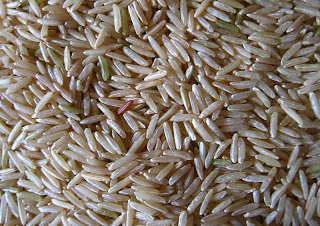 |
| Genetically Modified Rice for Vampires? |
Cathryn Wellner
Care2
Put away the Halloween costume. This is not a vampire joke. Chinese scientists at Wuhan University have been working on a genetically modified rice that can yield a human blood protein called human serum albumin (HSA).
Normally HSA protein is manufactured by the liver and harvested the same way any other blood ingredients are, through donations. In heavy demand for both medicinal (severe burns, cirrhosis of the liver, hemorrhagic shock) and laboratory (vaccines, drugs, cell cultures) uses, HSA is in perennially short supply.
China has experienced both chronic shortages of HSA and problems with tainted blood supplies. So Professor Daichang Yang, a plant biotechnologist, and his colleagues set to work to develop a rice that could carry the albumin gene.
According to Nature News, HSA-yielding plants such as potatoes have been used for the last two decades, but they have been too high cost and low yield for commercial use. Rice seeds, with their high protein content and high yields, are proving to be attractive carriers of the HSA gene.
Test results are promising. Nature News reports:
 |
| Advertisement |
The rice-derived protein was shown to be functionally equivalent to the version found in human blood plasma. Not only were the two chemically and physically identical, but they were also similar when tested for medical efficacy and immune reactivity. In rats with liver disease, both types of HSA proved equally effective in relieving symptoms associated with cirrhosis. And rats that were given rice-derived HSA showed no stronger immune reaction than animals that had been given the plasma-derived version.
Yang is hoping the US Food and Drug Administration will grant permission for human trials within the next two years. If clinical trials prove successful, rice may replace donor blood as the source for HSA.
In its report on the genetically modified rice, the Calgary Herald cautions:
Large-scale planting of genetically modified rice fields that could produce enough seed for mass production of the protein also raises environmental and food supply contamination concerns, since rice is a major world food staple.
Cross pollination among rice varieties occurs less frequently than among some cultivars such as canola. However, the Rice Knowledge Bank maintained by the International Rice Research Institute suggests up to 5% of a rice crop can be cross pollinated through wind, insects, birds, snails and water.
Given the biotech industry’s penchant for ignoring research that reveals numerous problems with genetically modified crops, enthusiasm for this new supply of HSA needs to be tempered with considerable caution.
For many more informative articles on important causes, visit Care2.com today.
linkwithin_text=’Related Articles:’


Be the first to comment on "Genetically Modified Rice for Vampires?"